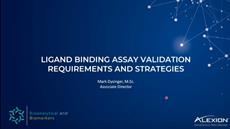- Partners for Progress in Oncology
- Accelerating Science Podcast
- Scientists' Choice Award® winners
- Blood testing
- Women in science
- SLAS
- Cell preparation, incubation & storage
- Microbiology & infectious disease
- Food safety & testing
- Cell culture
- Cancer research
- Cannabis testing
- Clinical laboratory diagnostics
- Mass spectrometry
-
More
Prof. Peter Tonge
Stony Brook UniversityThe promise of slow-binding enzyme inhibitors in widening the therapeutic window
22 Jul 2022
Knowing how tightly and how rapidly drugs bind and dissociate from their protein targets is key to understanding how drugs work in the human body. In this video, Prof. Peter Tonge shares his work investigating time-dependent inhibition, a key area of interest in drug discovery programs due to the opportunity for reduced dosing frequency and exposure, and resultant improvements in the therapeutic window.
Share this video
Related Scientists
Related Content

Prof. Peter Tonge
Stony Brook University Stony Brook UniversityBiography
Professor at Stony Brook University MoreProf. Peter Tonge
Stony Brook University
Dr. Peter Tonge is a Distinguished Professor of Chemistry and of Radiology (by courtesy) at Stony Brook University, where he is the Chair of the Department of Chemistry, and Director of the Center for Advanced Study of Drug Action. A primary focus of his program involves the integration of drug-target binding kinetics into predictions of drug activity to improve the selection and optimization of drug candidates. Projects in his lab include the design, synthesis, and evaluation of time-dependent enzyme inhibitors, the synthesis and evaluation of targeted protein degraders, the development of agents to image bacterial infection, and studies to elucidate how photoreceptors control and respond to the absorption of light. The translation of time-dependent enzyme inhibition or protein degradation to in vivo efficacy depends on target vulnerability, and a central goal of his program, is to develop vulnerability functions for targets particularly in antibacterial and oncology drug space. His awards include an Alfred P. Sloan Research Fellowship and a Fellowship from the Pharmaceutical Research and Manufacturers of America (PhRMA), which funded a sabbatical at Genentech.













